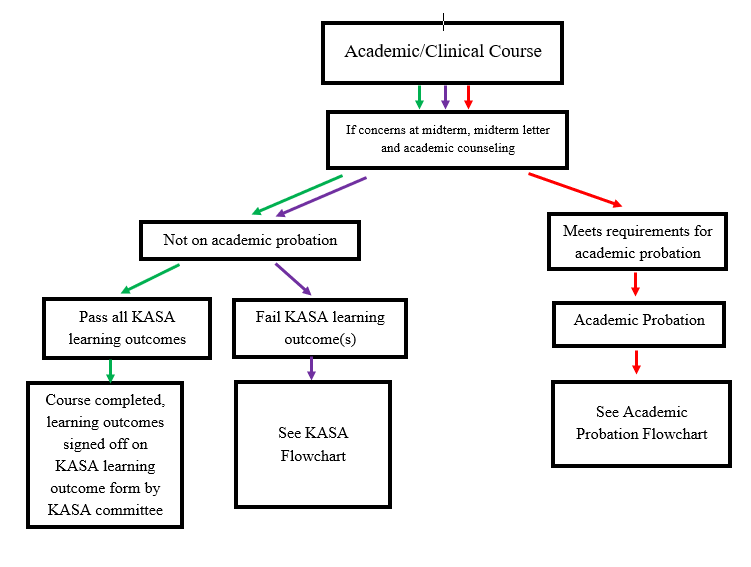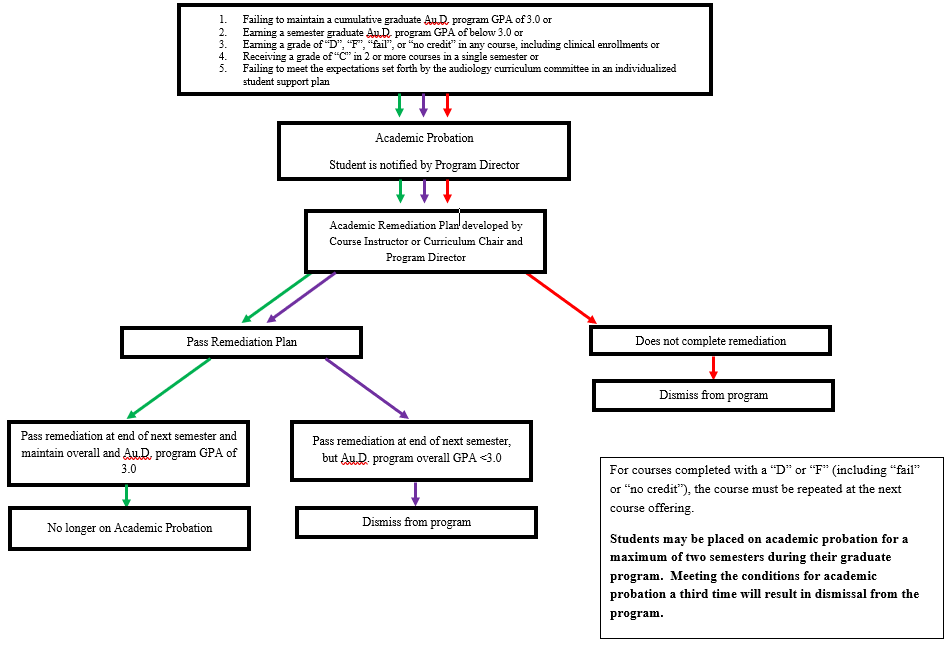AuD Academic Progression and Counseling Policies
Academic Counseling Criteria
The AuD curriculum is designed in a lock-step structure which is different in some ways from a traditional format. Students are required to take classes in a set schedule of semesters that are fixed at the start of the program. Unless they intend to withdraw or take a leave of absence from the program, students are not permitted to vary from this schedule. Each term, the faculty will review students' performance at mid-semester. If there are concerns about a student’s academic or clinical work, the student will receive a letter from the Program Director, instructing him or her to meet with the Instructor(s) to discuss the concerns and to determine what measures the student needs to take to return to good academic standing. Copies of all warning letters will be placed in the student’s file. (The TTUHSC SHP academic counseling policy can be accessed via:https://hscweb.ttuhsc.edu/health-professions/current/policies.aspx)See the “Academic/Clinical Course” flowchart in the Handbook.
Good Academic Standing
To remain in good academic standing, audiology graduate students must maintain a cumulative graduate Au.D. program GPA of at least 3.0, achieve a grade of “C” or better in all coursework, and currently not be on academic probation as defined below.
Academic Probation
A graduate student will be placed on academic probation for one or more of the following:failing to maintain a cumulative graduate Au.D. program GPA of 3.0
earning a semester graduate Au.D. program GPA of below 3.0
earning a grade of “D”, “F”, “fail”, or “no credit” in any course, including clinical enrollments
receiving a grade of “C” in 2 or more courses in a single semester
failing to meet the expectations set forth by the audiology curriculum committee in an individualized student support plan
Students on academic probation must complete academic remediation (see below). Students on academic probation will not be allowed to be placed in a clinical setting outside of TTUHSC until they return to good academic standing. If a student is not in good academic standing at midterm or receives midterm warnings for 2 or more courses, an externship placement for the upcoming semester will not be assigned until grades are posted confirming that the student will not be on academic probation for that semester. This may delay the start of the clinical externship and may result in a placement other than the student’s requested site.Graduate credit will be allowed for a course with a grade of “C” but the experience cannot be used to satisfy competencies for the KASA. Courses completed with a grade of “D” or below will not meet graduation requirements. For courses completed with a “D” or “F” (including “fail” or “no credit”), the course must be repeated at the next course offering. A course may be repeated only once. Failure to earn a “C” or better when the course is repeated will result in dismissal from the program. In addition, any clinical enrollment completed with a “D” or “F” (including “fail” or “no credit”) will result in loss of all clinical hours obtained during the semester and will not count toward departmental clock hour minimums. A student will not be allowed to graduate until all courses have been completed with a grade of “C” or above. See the “Academic Probation” flowchart in the Handbook. (Repeating a course does not replace the original grade. For the purpose of calculating graduate Au.D. program GPA, the grade obtained when a course is retaken is averaged with previous grades.)As per the SHP policy on Academic Probation, students will be notified that they are being placed on academic probation in a letter generated by the Program Director. Copies of the letter will be provided to the student, the Program Director, the Department Chair, and the Associate Dean for Admissions and Student Affairs. (Policies of the School of Health Professions can be accessed through the following URL: https://hscweb.ttuhsc.edu/health-professions/current/policies.aspx)
Academic remediation for students on academic probation
For students placed on academic probation, academic remediation plans will be developed by the course instructor and approved by the Program Director. See the “Academic Probation” flowchart in the Handbook. The student should be aware that some remediation plans will delay the projected graduation date. Options for remediation as approved by the Program Director include but are not limited to:
Individual tutoring with a program faculty member.
Faculty directed group or individual study.
Repeating clinical experiences/tracts.
Repeating course(s)*
*Repeating course(s) is the only option for students on academic probation for receiving a “D” or “F” (including “fail” or “no credit”). A course may be repeated only once. Failure to earn a “C” or better when the course is repeated will result in dismissal from the program.
Routine follow-up counseling with the student will be scheduled to assess and document the progress and outcome of the remediation plan. All meetings with the student regarding remediation must be documented by the faculty member(s) involved, to include the student’s understanding of the problem, willingness to cooperate and compliance with the plan.
Dismissal
A graduate student may be dismissed from the program for one or more of the following:- failing to obtain a graduate Au.D. program GPA of 3.0 upon completion of probationary period(s)
- failing to successfully complete remediation as documented in the remediation plan
- failing to earn a grade of “C” or better when repeating a course in which the student previously earned a grade of “D” or “F”
- failing audiology comprehensive exit examination remediation (see below)
- violating the academic and/or non-academic misconduct policies of the School of Health Professions.
- meeting the conditions that would result in academic probation a third time (i.e., students may be placed on academic probation for a maximum of two semesters during their graduate program).
If a student’s semester and/or cumulative graduate Au.D. program GPA falls below 3.0 or if the student is placed on academic probation for the final semester prior to being cleared for the fourth-year placement, the student’s fourth year externship (and subsequently, graduation) will be delayed.As per the SHP policy on Academic Dismissal (see https://hscweb.ttuhsc.edu/health-professions/current/policies.aspx), students will receive a “recommendation of academic dismissal” communication from the Office of Admissions and Student Affairs. The policy delineates the student’s rights to appeal the dismissal. A student who has been academically dismissed from the AuD program is ineligible for readmission to the program. Information regarding dismissal can be seen in the following flowcharts in the Handbook: Academic Probation, Comprehensive Examinations. Knowledge and Skills Acquisition
In addition to coursework, students must acquire knowledge and develop skills necessary for entry-level, independent practice of audiology. These knowledge and skills are delineated by the American Speech, Language, and Hearing Association current Standards for Certificate of Clinical Competence in Audiology. Students must meet departmental requirements for the acquisition of such knowledge and skills to graduate. The program director will meet regularly with the students to review academic progress, along with reviewing acquisition of knowledge and skills. For students not meeting specific knowledge and skills in a course, the instructor will develop a document outlining the steps for acquiring the lacking knowledge and skills for the student. This document must include specific requirements for meeting the specific knowledge and skills/learning outcome, along with a date of completion. Completion dates must be before mid-term of the semester following the course enrollment for a long semester (i.e., fall/spring) or end of the semester for the summer. Failure to successfully complete the requirements set forth in this document will result in the student being referred to the curriculum committee for an individualized student support plan. Failure to complete the individualized student support plan will result in the student being placed on academic probation. See the flowchart “KASA Learning Outcomes” in the Handbook.Audiology Academic/Clinical Course Flowchart

Audiology Academic Probation Flowchart

Audiology Comprehensive Examination Flowchart

Audiology KASA Learning Outcome Flowchart
